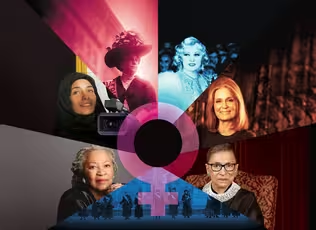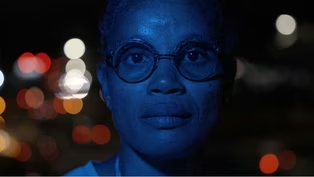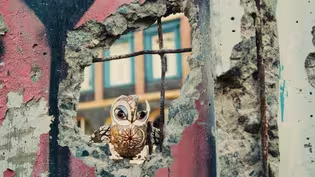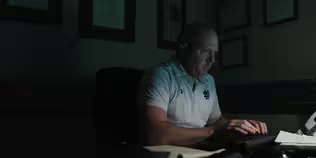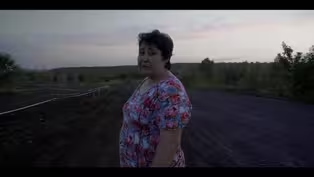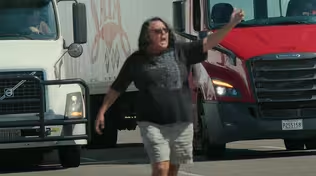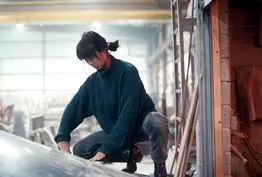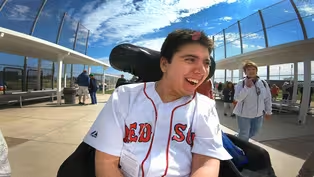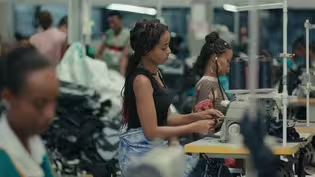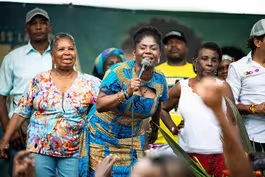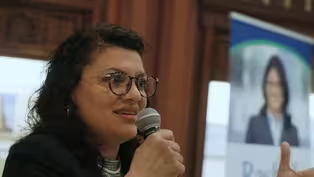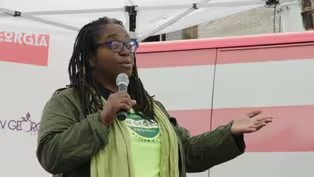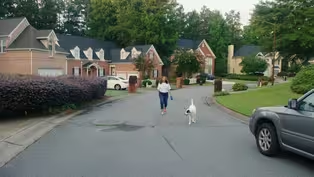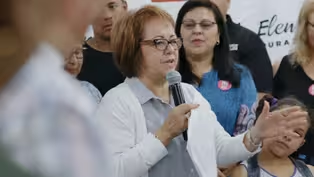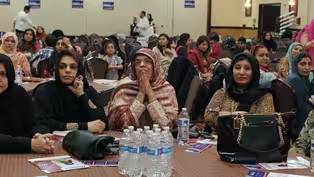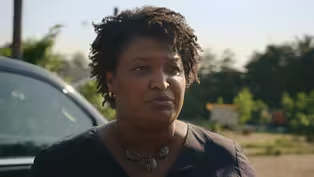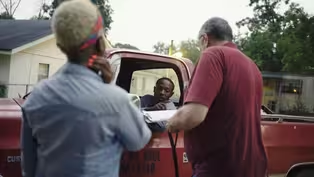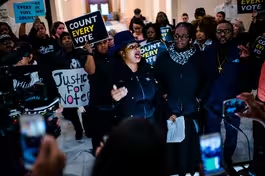
And She Could Be Next (Ep. 1)
Season 33 Episode 1 | 1h 54m 14sVideo has Closed Captions
A defiant movement led by women of color fights to transform politics from the ground up.
And She Could Be Next follows a defiant movement of women of color as they transform politics from the ground up. Filmed during the historic 2018 midterm elections, the series features organizers and candidates (including Rashida Tlaib and Stacey Abrams) as they fight for a truly reflective government, asking whether democracy can be preserved—and made stronger—by those most marginalized.
Problems playing video? | Closed Captioning Feedback
Problems playing video? | Closed Captioning Feedback
Major funding for POV is provided by PBS, The John D. and Catherine T. MacArthur Foundation, the Wyncote Foundation, Reva & David Logan Foundation, the Open Society Foundations and the...

And She Could Be Next (Ep. 1)
Season 33 Episode 1 | 1h 54m 14sVideo has Closed Captions
And She Could Be Next follows a defiant movement of women of color as they transform politics from the ground up. Filmed during the historic 2018 midterm elections, the series features organizers and candidates (including Rashida Tlaib and Stacey Abrams) as they fight for a truly reflective government, asking whether democracy can be preserved—and made stronger—by those most marginalized.
Problems playing video? | Closed Captioning Feedback
How to Watch POV
POV is available to stream on pbs.org and the free PBS App, available on iPhone, Apple TV, Android TV, Android smartphones, Amazon Fire TV, Amazon Fire Tablet, Roku, Samsung Smart TV, and Vizio.
Buy Now
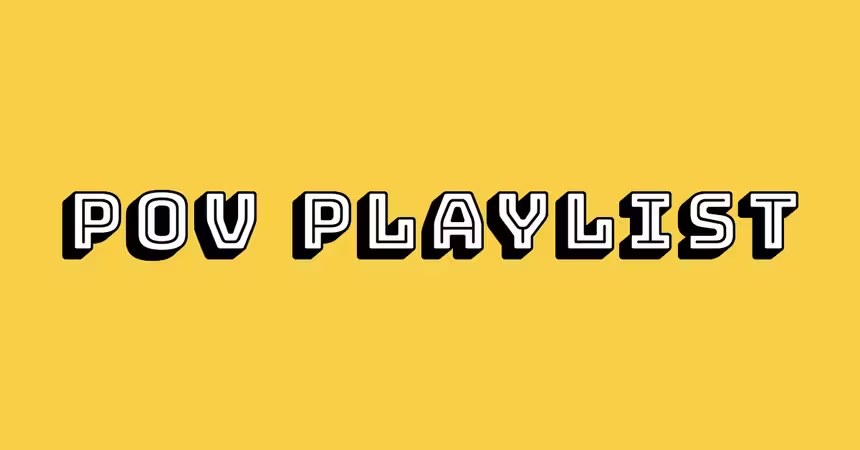
POV Playlist
Every two weeks, we curate a selection of POV docs, old and new, around a central theme. Stream while you can — until the next Playlist!Providing Support for PBS.org
Learn Moreabout PBS online sponsorshipMore from This Collection
POV Broadcast Feature Films.
Video has Closed Captions
Poet and activist Staceyann Chin chronicles her journey of healing, forgiveness, and mothering. (1h 23m 5s)
Video has Closed Captions
Confronting war, Ukrainian artists pick up arms while finding strength through art. (1h 22m 41s)
Video has Closed Captions
A small-town attorney takes on pharmaceutical giants as opioids devastate his community. (1h 22m 48s)
Video has Closed Captions
An environmental thriller that shines new light on the human cost of coal. (1h 22m 58s)
Video has Closed Captions
In rural Mexico, a community seeks answers, uncovering alarming truths about their water. (1h 14m 47s)
Video has Closed Captions
After losing it all, Desiree Wood takes a second lease on life as a long-haul trucker. (1h 23m 3s)
Video has Closed Captions
A family’s free life in nature is disrupted by tragedy, forcing them into modern society. (52m 53s)
Video has Closed Captions
A new “innovation district” tests local democracy in a divided Brooklyn community. (1h 22m 31s)
Maya Lin: A Strong Clear Vision
Video has Audio Description, Closed Captions
Follow the journey of Maya Lin behind the controversial Vietnam Veterans Memorial in DC. (1h 22m 54s)
Video has Audio Description, Closed Captions
A community of disability activists help Samuel Habib, 21, navigate the path to adulthood. (1h 22m 44s)
Video has Audio Description, Closed Captions
Three women navigate hope and change as a Chinese industrial zone transforms Ethiopia. (1h 22m 54s)
Igualada: Refusing to Know Your Place
Video has Closed Captions
A Colombian Black rural activist's historic bid for presidency stirs a national awakening. (1h 19m 49s)
Providing Support for PBS.org
Learn Moreabout PBS online sponsorship♪♪ ♪♪ ♪♪ [ Cheers and applause ] ♪♪ ♪♪ -I am so grateful to the thousands of you in this room, and around this state and around this country, who have joined me on this drive to history.
[ Cheers and applause ] -Women of color have been the backbone of our communities forever.
-In 1962, 18 of us traveled 26 miles to the county courthouse and tried to register to become first-class citizens.
-There has not been a moment in American history where you didn't find a woman of color taking the lead.
-We were born for such a time as this!
[ Cheers and applause ] -Come on out, brothers, we are waiting for you.
[ Crowd chanting "Sí, se puede!"
] -Women have a tremendous responsibility to help shape the future of America, to help decide policies that will affect the course of our history.
-I stand before you today as a candidate for the Democratic nomination for the presidency of the United States of America.
[ Applause ] -We are attempting on a larger scale to fulfill the promise of America.
-Do you have a militant attitude of civil rights?
-No, I don't have a militant attitude.
-Do you have a martyr complex?
-[ Laughing ] No, I don't.
[ Laughter ] -There are not enough people on the inside that look like me.
-But the demographics are changing.
It's not a traditional America anymore.
The white establishment is now the minority.
-With people of color becoming the new American majority, how are we going to create a new vision for this country?
-Sisters and brothers, it's about building power in our community to win what is right.
-Black lives matter!
Black lives matter!
-We're here to stay!
-Follow women of color, sisters and brothers, because when we fight for justice, we fight for it for all people.
-No hate!
No fear!
Refugees are welcome... -I am here today to acknowledge and represent the African-American girls whose stories don't make the front page of every national newspaper.
[ Cheers and applause ] -And, you know, I'm sick and tired.
I think a lot of us are sick are tired.
-Today's midterm elections feature the most diverse group of candidates in US history.
A record number of women, people from different ethnic backgrounds, are running for all levels of government across the United States.
♪♪ ♪♪ ♪♪ ♪♪ ♪♪ -How's the Internet right now?
-It's good, Adam.
Send me the stuff.
You're still working on it, I can see.
-No, this is all it.
I just need to send it to you.
-You sound congested.
-I am.
I'm sick.
Everyone -- my Baba, you, all of us are congested.
-I don't know if this is -- -Except Yousif, the lucky guy.
He's not even congested.
-Hey, Yousif.
Come here, mama.
-What?
-Come here.
Come see this.
-[Indistinct] I'm kidding.
-Yeah, it's one of my dad's -- -You're turning into a teenager.
[ Keyboard clacking, video plays indistinctly ] -Are you gonna be the president?
-No, mama.
[ Keys jingling ] I remember as a kid, Arab-Americans running for office or even our fire chief or somebody that was, you know, appointed positions, you know, in leadership, at the forefront was not their ethnicity -- that was something they hid.
There was this whole thing of trying to first prove themselves as Americans before they even mentioned their ethnic backgrounds, where today, you know, you got all of us saying things like, "I'm a child of immigrants," "We're of Muslim faith."
When I say things like, "I'm a social justice seeker, I'm a mama for justice," or all these things, that's where I'm saying, "I'm American."
I don't need to say it.
I act like an American.
Running for office and challenging big, powerful corporations, and pushing back on those that go after the weak or the disadvantaged -- that's being American.
[ Crowd chanting indistinctly ] [ Cheers and applause ] -This is what democracy looks like!
-[ Together ] This is what democracy looks like!
-This is what democracy looks like!
-Hey, how are you?
Come on, come on.
-That's cute.
-Yeah.
I like the white suit -- it's like Yaba.
[ Laughs ] Hey.
Nice to see you.
Good.
Hey, how's it going?
Thanks for everything.
I appreciate you.
Hi!
Salaam alaikum!
Hey!
Thank you so much for coming.
Hey!
Thanks, you guys, for coming.
-Mom.
-Yes, mama.
-Can we get food?
Can we get everything?
You're just standing there, and... -Well, let me tell you -- let me tell you what this is.
This is a fundraiser, right?
And this is where we're raising money for the congressional election, mama.
-Is five minutes good?
-Yeah.
-Okay.
-I just want to work on, like, my points.
-Sure.
-Is that okay?
-You're the boss.
[ Indistinct conversations ] -Good evening, family and friends.
I want to thank you all for joining us in support of my Auntie Rashida.
Just last weekend, as I was helping seal thank-you letters to all my auntie's supporters -- and there were a lot -- I couldn't help wonder what her job really was.
All these years, I just thought it was yelling at people.
[ Laughter ] Well, look at her now -- she can't be stopped.
[ Laughter ] Today, ladies and gentlemen, I proudly present to you your future 13th District Congresswoman -- Rashida.
[ Cheers and applause ] -You did such a good job!
So, this is a very unique time in our country.
I think we're gonna look at this back later, in 10 years or 15 years, and people are gonna wonder, "What were you doing at this moment?"
And so when I got asked, "Why are you running?"
you know, it's very emotional for me.
I remember when they had this huge cartoon of Muslims as Nazis.
And I was talking to my kids' dad and I was like, "You know, Fayez, they're gonna want to kill us."
And my son, who's 9 at the time, walks in the door and says, "Mama, don't worry.
if anybody asks if I'm Muslim, I will lie and tell them I'm not."
And it just broke -- I broke down more.
I mean, I worked so hard to be who I am, be a Filastinia, be an Arabia, be a Muslima, be loud as a woman, and now my son is, like, going to hide a piece -- a strong part of who he is.
And it just -- it was devastating to me.
So I'm running because growing up the way I did, I knew what it meant not to have a seat at the table.
I knew what it meant when somebody closed the door on you.
I hated it.
But you know what?
If there was a moment for the type of approach that I have, it's now.
And I want you all to believe in that bigger picture and believe in that movement that we're all gonna be part of.
-People's Station, V-103, the ATL's number one for hip-hop and R&B.
Stacey Abrams has won the Democratic primary in Georgia for governor, and has made history in the process.
The former state house leader now becomes the first black woman to win a major-party nomination for governor in the United States.
-When I first started thinking about this job, I didn't know I was thinking about this job.
You see, back when I was in high school, like, I graduated as valedictorian in DeKalb County.
[ Crowd shouting ] And when you're valedictorian in the state of Georgia, you get invited to meet the governor of Georgia.
[ Crowd cheers ] And so we get on the bus and we take it to West Paces Ferry.
But when we get to the guard station, the guard comes out, but he doesn't say, "Hello, Stacey, welcome in."
He doesn't ask for our names.
He looks at my parents and he looks at me, and he says, "This is a private event.
You don't belong here."
[ Crowd shouting ] My father says, "No, no, no, this is my daughter Stacey."
She's one of the valedictorians.
She was invited to be here today."
But the guard doesn't check his checklist.
He doesn't ask my mom for the invitation that's in her purse.
Instead, I remember, clear as day, him looking over my shoulder at the MARTA bus as it pulls away from the curb taking working families to their day jobs, taking folks to church.
Wherever they are going, he doesn't think they should be coming to the Governor's Mansion.
Because when he looks at me again, he says, with a sneer on his face, "Look, I told you, this is a private event.
You don't belong here."
But after a while, he found my name on that list and he let us inside, but I don't remember meeting the governor of Georgia.
-Wow!
-I went inside that building, but couldn't tell you what we ate, and I couldn't name a single person I met inside, not one of the valedictorians from 180 school districts, from 159 counties.
-Wow.
-You see, all I remember about that day is a man standing in front of the most powerful place in Georgia, looking at me and telling me I don't belong.
[ Crowd shouts ] -Black women are confronted with the consequences of the leadership we've always had, which has been that you are welcome to be the worker, you're welcome to be the voter, but it has been difficult to break in and become the candidate, because you have to have money, you have to have resources, you have to have people who stand behind you.
And often, we are expected to stand quietly behind others, but we are never expected to be the ones in front.
-Jobs, justice, peace.
This is a theme that we've been hearing over and over again.
This is a theme that came out in 1963 when A. Philip Randolph, a trade unionist, came forth to call for a march on Washington, asking for an end to Jim Crow laws, equal access to public education, and civil rights legislation that would change the face of a nation.
-I've always been interested in policy.
Politics came a little later.
I used to go to city council meetings as a freshman in college because I did understand what government did.
But it wasn't until government attacked my college and my community, and teargassed us in the wake of the Rodney King riots.
I got into a little bit of a disagreement with the mayor in a public space.
But in response, he actually hired me to work for the Office of Youth Services at the city.
It crystallized for me how important it was not only to see what was happening, but to be heard in the process.
-We ask you to let us come forth with you, not behind you, not in front of you, but together.
[ Crowd call-and-response chanting "Stacey Abrams!"
] -Whoo!
[ Crowd cheers ] [ Crowd chanting "Abrams" ] [ Cheers and applause ] -Thank you so much.
Georgia is an amazing place.
It is my adopted home.
And I adopted Georgia for a reason, because Georgia adopted me.
When I moved into the state -- -Whoo!
-Thank you.
[ Laughter ] When we moved here when I was in high school, this was the place my parents taught me was the cradle of civil rights.
And that is why I was so proud in 1991 to graduate as valedictorian of our high school, and in 1993, to stand at the March on Washington and talk about voting rights.
And this is why the state of Georgia allowed me, in 2014, to begin a process that has registered more than 200,000 people in the state of Georgia.
[ Cheers and applause ] -A liberal group called the New Georgia Project made big waves on the left this year when they estimated that there are 800,000 African-Americans, Latinos, and Asian-Americans in Georgia who are eligible to vote but are not yet signed up.
The founder of the New Georgia Project, Stacey Abrams, set a goal of registering 120,000 of those people to vote this year.
[ Drumming ] ♪♪ ♪♪ ♪♪ [ Cheers and applause ] -Give it up for Nse!
The New Georgia Project.
-Yeah.
-'Cause the old Georgia wasn't working too good.
-I mean, listen.
[ Laughs ] -Here we go.
-I appreciate it.
Hey, hey, hey.
Good morning, everybody, good morning.
-Good morning!
-So, my name is Nse Ufot.
I run an organization called the New Georgia Project.
Today, we've helped over 300,000 Georgians register to vote, in all 159 of Georgia's counties.
There's a lot of conversation about the browning of America, but nowhere is that change happening more acutely, more aggressively than in the state of Georgia.
So Georgia's gonna be the first state in the Deep South with a white minority, meaning that African-Americans, Latinos, and Asian-Americans are gonna make up the majority of Georgians in just six years.
And we are terribly excited about Georgia's new multiracial, multiethnic future, and what does it look like when we elect politicians who come from the communities that represent all of Georgians and who are accountable to all of Georgians, and not just the elite.
But there are conservatives that are not excited about Georgia's future, and they are making it very, very, very difficult for people to vote.
♪♪ -I was introduced to Stacey Abrams by a mutual friend, to talk about her vision for Georgia and what the possibilities were with -- you know, at the time, we were looking at a million unregistered but eligible African-Americans, Latinos, and Asian-Americans, and unmarried, single white women.
You know, she laid out a plan for how to register them all and figure out how to get them sort of all active and engaged and informed.
And at the time, I was like, "Oh, that's adorable."
[ Chuckling ] Like...
I'm from here, right?
I understand Southern politics, I understand Georgia, and what you're proposing is crazy.
They would never let you do it.
And then we -- that kicked off a months-long sort of series of conversations about, like, fighting for the Georgia that we know is possible.
♪♪ So, this is very much a tradition of black church politics, or black politics, or Southern politics.
-Yeah.
-We are campaigning out of a church basement.
-Yes.
-So... -We all know that for decades and generations, people have utilized the black girl magic, but not invested or created the space, or even supported the actual direct leadership of black women.
-Because I feel like, so often, people want black people, but not black experiences.
-Mm.
-So it's like, "Oh, I have a black this," but it's not somebody who even is like, routed in community.
-When you solve for black women's issues, you solve for everybody's issues.
-Yes.
-Am I right?
Because we're the ones that are dealing with substandard education, healthcare -- multiple healthcare problems.
We're dealing with our finances, and we're often the primary breadwinner in the homes, because a lot of us, myself included, are single moms.
And I think, like, black women lead from a place of experience because they've experienced that firsthand, either themselves or through taking care of their family.
-I am so sick of people with limited imaginations, right, and small minds, telling us what's possible, when I see how excited people are.
-Mm.
-Yes.
-We're no longer asking for permission to do what we need to do.
We're going to do it, and we're gonna lead from the top, and people need to see it.
-Have you guys voted?
-You're good?
-Good?
-Yep, Stacey Abrams!
That's correct.
Thank you!
-Are you Timothy?
-Yes, I am.
-Hi, I'm Tishaura Jones.
I'm here all the way from St. Louis, canvassing for Stacey Abrams for Governor.
Have you heard of her?
-Yes, ma'am.
-Do you plan on voting for her on Tuesday?
-Plan on voting.
You know, red or blue, I want to do what's best for the state.
-Absolutely.
-Exactly, exactly.
-You know, whether it's red or blue, black or white, or whomever.
-Stacey stood up when she was a floor leader, and worked with the Republicans to develop a compromise.
And that's what politics is about, right?
Compromise.
-Right, right.
[ Cellphone ringing ] -I have a much smaller operation than Stacey.
[ Both laugh ] [ Ringing continues ] But I'm sure they all started somewhere.
-Hello, this is John.
-Hi, John.
This is Lucy McBath.
I just wanted to tell you a little bit about myself.
I am a longtime Georgian, and I have been working in the gun violence prevention realm, as well as the civil justice realm, for the last five years.
I have called myself an accidental activist because I never imagined that I would be an activist for gun violence prevention.
But at the time that Jordan was murdered...
I was living just a normal life, working for Delta Air Lines.
I got so much stuff pertaining to Jordan and all of the media and the articles and op-eds I've written -- all that stuff.
It's been hard trying to figure out where to house it all, where to keep it all, so I keep a lot of everything here.
Yeah.
You know, 'cause that's the reason why I got started, because of Jordan.
-Jordan was shot and killed almost two years ago, when an argument that began over loud music got out of hand.
Dunn fired 10 shots at the SUV Davis and three friends were in outside a gas station.
♪♪ -I thought that, you know, we're living in a nice neighborhood, and Jordan's being educated well, and you know, we're living a pretty decent life, so this was a cultural awakening even for me.
Because it doesn't matter where you live.
It doesn't matter how you've raised your children.
None of these things matter, because my son was still a young black man.
But, of course, once it happened to Sandy Hook, then it, you know, blows up and everybody's concerned about gun violence.
And so, Moms Demand actually gave me the opportunity -- you know, they would put me on a plane and they'd send me around the country, say, "Would you go talk here?
Would you go talk there?
Would you tell your story?
Just tell your story."
And I did.
I've learned how to organize.
I've learned how to build movements.
Man, I've even started going to legislators.
[ Voice breaking ] That's why the work is so important to me, 'cause it's about helping people live and survive... in this world, in this nation, that doesn't always embrace all of us.
What I began to recognize is that my background with my father, the civil rights background...
He was Illinois branch president of the NAACP.
You know, Daddy was at the signing of the Civil Rights Act.
And I understand that now, 'cause I feel that same sense of urgency and commitment.
We've got to get in on the inside.
There are not enough people on the inside that look like me.
You're building the movement on the outside, but if you don't have the legislators on the inside that are creating the policies and the initiatives and the amendments and the bills... ...then it's going to take us forever.
♪♪ ♪♪ [ Helicopter blades whirring, indistinct conversations ] -So, you ready?
-So, we're keeping on, keeping on, nonstop, nonstop.
We got to keep it going, keep it going.
-I'm gonna also ask you why you're doing this after all the years.
-[ Laughs ] -No, I'm joking.
But... -We can't take anything for granted.
When -- When those...
Remember around the time of Kevin's legislation, when all these really small cities were asking their cities to pass -- What?
-No, I'm fine.
-It's alright.
-That's okay.
I say what I say with a mic on or off.
[ Laughs ] [ Cheers and applause ] Okay!
Good morning, buenos días, 226, 165, and all our locals all over the country.
Buenos días.
When we get rid of Heller as the United States Senator, California's gonna be much better off for that victory.
[ Cheers and applause ] That means we are one step closer to dumping Trump.
[ Cheers and applause ] That's what it's all about, right?
And all the people like him.
Todo gente como Trump.
Porque nos dañan mucho.
They hurt us.
In California, a few years ago, we were a red state.
[ Speaking Spanish ] -If you stop organizing, you go backwards.
If you stop organizing, you end up with Donald Trump.
-We vote... -[ Together ] We win!
-We vote... -We win!
-Votamos... -We're losing rights that were long ago established.
We're afraid of losing more rights.
And so I became convinced that with all my life experiences, that I could be one of the people in Sacramento, to continue to fight for the things that I believed in.
For me, the most successful of all of this is how I get to know more people who are actually organizing on the ground.
They've got solutions.
They're the experts.
You know, they're the ones who come up with not only ideas, but what to do about it.
And they do that hard work every day of organizing, so I want that to be the focus, and not a lot of stories about me.
Voters need more than just, "Here's someone who's gonna save the day."
That just doesn't work.
You know, my mom -- rest in peace -- she was so funny.
Every time before she went out, she'd go, "Dónde está mi lippy-sticky?
Tengo que poner mi lippy-sticky?"
So before I leave, I got to put my lippy-sticky on.
[ Laughs ] God, I hope I'm not forgetting anything.
My parents came from Mexico.
We were a migrant farmworker family.
We lived out of our flatbed truck.
And when I was in high school, I had the benefit of having a lot of movements around me.
So I went to college and to law school, and then it was no longer just student issues, then it was the broader issues -- it was about immigration, it was about working family issues.
That's how I then got connected from community activist, immigration rights activist, to union activist.
Todos tenemos dignidad y por eso ellos tiene que salir a votar.
[ Cheers and applause ] How's it going?
Hi.
-Yay!
-Yay!
Hi.
-I'm here just to volunteer, you know, on my mom's campaign, whatever she needs -- you know, waking up early in the mornings, picking up burritos, setting up chairs.
You know, I'm...
I'm a jack-of-all-trades for the campaign.
[ Applause ] -Okay.
[ Cheers and applause ] [ Cheers and applause ] -So, what I love about our movement, is to meet people like you, who every day fight for those that they try to shut out of the American Dream.
And we have to give more faith and hope to these voters.
It's unacceptable for our community to stay home because they don't feel that it's worth their time, 20 minutes to go cast their ballot.
That is -- There's something wrong with that, and we have to take the responsibility for changing that.
♪♪ ♪♪ -Thank you.
Check-in is right here.
-What's your last name?
-[ Indistinct ] -You are not the only Fatima on my list, so... -[ Laughs ] It's okay.
-Okay, yeah, fine.
-Alright, 7:00 to 4:00.
You're all good.
Thanks so much.
-Alright, please take a seat.
Thank you all for coming to sign up and help us out on Election Day.
My name is Bushra Amiwala.
If you did not know that, maybe this is not the place for you.
Ha-ha-ha.
Should've done stand-up, right?
Okay.
So, the task is super simple, and this won't take up too much of your time, but I wanted to see the different people signing up to do something like this.
Two, I wanted you all to meet me in person in case you haven't before.
And three, so we can give you all the materials you need to make sure you have a successful Election Day.
Your job is gonna be to have a stack of the fliers, and to every single person, before they walk in to vote, you hand them a flier.
There will be a ton of people trying to hand their fliers, as well.
Wrestle them, okay?
Your flier needs to get in their hand.
And say, "Hi, please vote Bushra Amiwala for Cook County Commissioner, number 91."
That is it.
'Cause think about it -- if I get elected, I would be the first Pakistani Muslim woman to ever hold office in the United States.
[ Crowd cheers ] -Thank you, thank you.
Okay.
-Yeah.
-Inshallah.
-Inshallah, yeah.
It's exciting.
And what are we gonna say?
Can we say it together?
Hi, please vote Bushra Amiwala for Cook County Commissioner, number 91.
And smile!
♪♪ -I feel like, particularly young women, we're often told that you can't make a difference, and like, I'm tired of old people having so much control over my life when they don't know so much about it.
-Our elected official for the past 16 years has been this 70-year-old white guy.
17 commissioners are on the board, but only two of them are women.
And I was like, "What?!"
Like, how did they, like, make that?
Like, how?
♪♪ -Look how freaking popping this is.
-Wow!
-Allie and I will do this.
-Okay, perfect.
-Cool.
-Hi, there.
Hi, there.
My name is Bushra Amiwala.
I'm running for the Cook County Board of Commissioners.
-Your first name is... Oh, no, wait -- Your last name is Amiwala.
-Mm-hmm, yeah.
-Okay.
What do you do for a living?
-I'm currently a student at DePaul University.
-How old are you?
-I'm 19.
-Holy [bleep].
-Yeah.
-I'm this huge makeup fanatic, just 'cause, like, it's a part of, like, Pakistani culture.
It's something that's, like, always stuck with me.
And I've definitely toned it down from, like -- I remember in my campaign video that I found, like the one where I was declining PAC money.
You know, I just uploaded it and recorded it how I would any other video, but I got a message from a man and he was saying, he's like, you know, "Loved the message, but next time, you should probably try to wear a little less lipstick."
And I was like, "Oh!"
So, like, honestly, that stuck with me.
I wear a lot less lipstick now.
But I used to debate in high school.
So, I was the champion of the Harvard University Debate Tournament.
We -- My partner and I, we came in first place.
And, you know, at the end of it, the judge, he came up to me and he was like, you know, "You know, I just wanted to let you know, like, I couldn't help myself, but I've never met a Muslim woman as articulate as yourself."
And, you know, that just reminded me that before seeing me as Bushra the debater, he saw me as Bushra the Muslim first.
I wish they would see that I'm Bushra the political candidate or, like, Bushra the student, Bushra the person with the fresh perspectives and ideas.
[ Cellphone buzzing ] Hold on.
[ Laughing ] My mom is calling me.
-Cards and stuff.
You want to put them... -Okay.
-Bushra Amiwala!
[ Laughs ] I am so proud of her.
-The first time, like, I thought about running for office, I was like, to my mom, I was like, "I think I'm gonna run for office," and she, like, thought I was kidding.
She -- She was like, "Okay," like... -I was shocked.
I said, "What?"
I said, "Are you joking?"
And she says... -No.
-And as a mother, I was scared a little bit because I heard a lot of things about politics.
So first, my concern was, "Bushra, is that safe for you?"
-At that time, there were, like -- we didn't know of any young people, especially any Muslim people, running for office.
-And my husband says, "Yes!
Go!
Go for it!
I am with you."
-Salaam alaikum.
Hey!
Salaam alaikum, guys.
Oh, there's a partition?
-Yeah.
-Oh.
Okay.
-Do you not want there to be a partition?
-No, 'cause there are white people coming, too.
-I already talked to them.
-Okay.
-And they said, yeah, because some woman asked... -Yeah.
-...for the separate... -Okay, like partial, maybe?
Just because, like... [ Speaking Urdu ] -Okay, okay.
-Nothing to worry, yeah.
-Okay.
Okay.
As-salaam alaikum.
Peace be upon all of you.
So, growing up, I never was really involved in politics that much.
I wasn't that interested in it.
But somehow, I was still drawn to all of the issues that were dealt with at the political level.
So, the opportunity came up to work for our senator at the time.
Because with that, I would have to ask various registered Republican voters a series of five questions.
The first question on that list was, "On a scale of 1 to 10, how fearsome are you of an Islamic terror attack on U.S.
soil?"
So I'm standing there with a hijab on and I'm basically asking someone, "How scared are you of someone who looks like me bombing your land?"
And you know what their answer was, almost every single time?
10 -- very fearsome.
Every time someone said 8 or above, I would say, "Why?"
And the universal answer almost every time was, "You're the first Muslim person I have ever met."
And this was in Glenview, Illinois, which is 2 miles from here.
And a lot of the people on the campaign said, "Well, Bushra, what do you see on the media?
You see people after terrorist attacks".
And they're like, "Show us an example of a Muslim in the news doing something good for this country."
We don't have to be victimized first to be leaders.
[ Horn blowing ] -In the day's other news, President Trump moved to have governors deploy the National Guard along the U.S.-Mexico border.
-This show of force at the border barrier just west of El Paso recently was part of a series of exercises designed to demonstrate Border Patrol agents' readiness.
-If you cross the wall, you will be in violation of U.S. federal immigration law, and you will be arrested.
♪♪ ♪♪ -Oh, I'll show you -- I'll show you an interesting spot.
That guy, to me, is all El Paso -- like, power and strength and pride.
I just friggin' love it.
Yeah.
In 1993, I graduated from NYU with a masters degree, came back to El Paso.
There was a Border Patrol chief, and that Border Patrol chief was a Chicano hometown guy, and he was the first person to talk about building a wall in a way that kind of woke me up, and at that point is when my life changed.
I'm gonna show you the site where there is now gonna be a wall, I mean, just -- ugh!
That's gonna be the wall here.
That's a lot of steel.
-Okay, but we have to get -- we have to get back across.
-Thank you.
-Okay.
-You know, the wall isn't actually going on the border.
It's essentially creating a new American border.
It's because it's moving into what's either private property or public land, and it's positioned awkwardly.
Like, here, you can't have a contiguous wall, 'cause of the train tracks.
So how do you maneuver that?
There have been billions of dollars spent on militarizing the border, and what that does is it dehumanizes our community.
And I'm gonna show you the county courthouse where I worked for 12 years.
This is it right here, where we've reformed and transformed local government.
-All eyes are on two congressional races in Texas.
If elected, former El Paso County judge Veronica Escobar could become the state's first Latina to serve in Congress.
-Late last August, I quit a job that I loved to run for Congress.
And as challenging and difficult as it's been for my family and the sacrifices that they've had to make -- we've been without an income on my end for over a year, and it's been kind of like the gamble of our lives -- it's been an incredible journey.
-My Mom and Dad are both from Hattiesburg, Mississippi.
They grew up there in the 1950s, and so we ended up part of the working class or working poor, depending on the day.
My Mom didn't like either of those terms, so she called us, the genteel poor.
We had no money, but we watched PBS and we read books.
[ Laughter ] My parents wanted us to understand, though, that where we lived was not gonna dictate where we would end up.
And so they told us we had three rules -- go to church, go to school, and take care of each other.
But we have a brother named Walter.
Walter's a brilliant man.
He went to Morehouse College.
But Walter dropped out of school before he finished college because my brother is a drug addict.
-Come on!
-Not only is he an addict -- my brother, it turns out, is bipolar.
When he first started presenting, we realized he may have been 16 or 17 years old, but our family didn't have health insurance.
-That's right.
-Come on!
-And when Walter went to a state prison, they stabilized him by finally giving him the medication he needed for his mental health issues.
He was clean and sober for the first time in almost 15 years.
-Testify!
-But when Walter got out of prison, he lost his health insurance because until you expand Medicaid, ex-offenders are not entitled to coverage.
[ Applause ] My responsibility has always been to make certain there was a place at the table, because you cannot say someone has power if they don't know where it is and they don't know how to use it.
-What made me decide to make buttons is because that my mom passed from gun violence on my 10th birthday.
And I realized that some people don't like to speak with their words, and they can speak by wearing buttons and share their story.
-He's on a mission to stop gun violence as much as he can.
So that's why we're here today, to vote for Stacey.
-I'm very proud of you, and I appreciate you.
You need to grow up faster so you can vote for me.
-That's what I said.
-Okay.
[ Laughter ] -Thank you.
-Thank you so much.
-You're holding on tight.
I love it.
[ Laughs ] -Thank you.
-I talked about how I wanted her to win for governor so that we can get the guns out of the wrong people hands.
-Hey, baby.
[ Groans ] I'm here.
♪♪ ♪♪ This November would be six years.
♪♪ It just doesn't get any easier.
♪♪ I don't know, on days like this... [ Sniffles ] [ Crying ]...I keep telling myself I'm still a mom.
♪♪ ♪♪ It's like I keep trying to scream to the world, "Don't forget about me!
I'm still a mom!"
You know, some people don't tell me happy Mother's Day because they don't know how to...
They don't know how to treat me.
They don't know what to say.
I just want people to say happy Mother's Day to me, too.
I think Jordan is proud of me.
-Hi.
Salaam alaikum.
It's okay.
It's okay.
You're busy, it's -- -Yeah, no, I've been there.
-What's your address?
-Okay.
[ Speaking Arabic ] [ Chuckles ] Thank you.
Thank you.
[ Telephone ringing ] -Rashida for Congress, may I help you?
-And it's really hard to ask for money as a woman.
It's just, I struggle with it.
Even though this is my fourth campaign -- or fifth now, campaign, it's still really hard.
So Steve's the one who actually convinced me to run for office.
You know, this white Jewish guy from...[ Laughing ] And it's interesting from where we started to where we are now, because I feel like I do use his whiteness to my advantage.
I tell him all the time.
[ Laughter ] No, because as a woman of color, sometimes it's really hard.
And like, I was talking to Brie Anne about it, but that's what makes him even more special.
It's like he doesn't even...
I mean, he doesn't even realize, but sometimes it helps if he's calling instead of me.
And that's unfortunate, but he proudly takes on the task for me.
And I appreciate it.
I remember saying to him, "Steve, you don't understand.
I made a list.
And people can't pronounce my name.
I'm Muslim.
I stick out.
I mean, it's a majority Latino, African-American community.
This is gonna be impossible."
-[Indistinct] -He said, "Rashida, people can't say my name -- Tobocman."
He said, "You know what they're gonna care about, Rashida, is when you knock on their door, is how you made them feel."
-Who likes Turkish coffee here?
-Andrew -- he's kind of a, I call it, "Rashida whisperer."
-Yeah, I mean, we've...we've... You can see it's crazy.
Like, why -- why are these not part of this district?
This is, like, such a great example of gerrymandering.
And we've got 12 different cities in this district, but then, you know, parts of cities.
Downtown is right here, and you can see they've, for some reason, cut out parts of the riverfront.
So, this is not a homogeneous district.
This has a lot of different people and cultures, and, you know, it's a lot of different priorities.
-Oh, 429.
That's it.
-The day after I graduated high school, I'm like, "Ah!
Back full time.
Let's go."
While I was in high school, I'm like, okay, there got to be something I can do for the campaign, just 'cause I'm, like... She's one of us.
I mean, she grew up in southwest Detroit, went to Southwestern High School.
She comes from the same area as I do, fights for the same things I do, and is not scared, doesn't sugarcoat anything, just goes straight at it, straight to the point.
Rashida used to represent this area before, for I think six years until her term limited out.
Are you familiar with her?
Oh, you're familiar with her work, so you already know.
Hi, how you doing?
-How y'all doing?
-Good.
Are you Mr. Barber?
-No.
-Well, can you just leave him this and tell him that someone from Rashida's team stopped by?
-Okay.
-Alright, you have a good one.
-You too.
-Mm-hmm.
-We're optimistic because we don't see anybody.
-Right, there's no one else out here... -No.
-...like, from this district for who's running for Congress.
No one else's field team is out here door-knocking.
I'm just like, "Really?"
-One guy, I came up with the pamphlet, and he stopped me right away, And he's all, "Oh, no, I already voted for her."
I'm like, "Oh, perfect, sir.
Is there any feedback you want to give us, or is there something you want us to tell Rashida concerning your community?"
Et cetera, et cetera.
He's all, "You know, honestly, you know why I voted for her?
I called Brenda Jones, their campaign, and I asked them, 'Hey, is somebody gonna come by the neighborhood?
You know, I might want to sign."
And they never came by.
-You know, when we try to get things done out here, Rashida come out here.
Now, being...I think she's Mexican, or...?
-Nah, she's American.
Her parents are from Palestine.
-Okay, but just the same, half of these people can't afford the taxes they got now.
-Mm-hmm.
-Yeah.
-When you move outside of this area, your taxes gonna triple, double.
How they gonna maintain?
Man, I'm just... -I feel you.
I got you, sir.
I got you.
-You know what?
I love my city.
I told them I'd be the last person to turn the lights out here, but I'm to the point right now, pfft, I really don't care.
You know, I really don't.
I don't care no more.
-It's a very, very challenged district because it's the third-poorest congressional district in the country.
♪♪ This is all my district.
What I love is, Detroit is so big that even though you might be born and raised here like myself, you don't really get to know it like you do when you actually get to walk in the streets and talk to people.
It's great.
I don't care what anybody says.
Like, you can't replace the kind of people you're gonna meet here than anywhere in the United States.
We're gonna have a conversation with a woman who basically is someone that is very connected to a lot of church communities.
I bet you she uses the side door.
Let's do that.
-Hey!
-Hi!
Ms. West, how are you?
-I'm good.
-How's it going?
-Good.
Been on the phone for you for all morning long.
-Thank you so much.
-[ Laughs ] -And Reverend had a bus, and we went there.
That was years ago.
-You looked even happier there, too.
-Mm!
I love this.
-That's my deaf son, with Fieger.
I was his church coordinator when he ran for governor.
That's me with Coleman, his last fundraiser.
-My dad loved Coleman Young.
-Uh-huh.
And first black governor Wilder.
-Uh-huh.
-Yeah.
-Oh, that's amazing.
-Sit down!
Throw your coat over there and have a seat.
Let's talk.
I've always sent pastors résumés.
I like them to know a little bit about you.
-Yeah.
-All of them, you don't have to meet, I'll let you meet a few of them that I want you to meet because they're so-called big shots, you know what I mean?
You know, so I mentioned to her about a scripture, but she said because you're Muslim, you don't have a scripture.
-So, there's a saying -- there's a saying in the Qur'an.
It's called, "With hardship comes ease, with hardship comes ease."
It's my favorite scripture.
-Amen!
-But sometimes I do forget to introduce myself 'cause I'm nervous.
-You got to introduce yourself.
-I know that, but -- -Good morning!
-Good morning.
-"Good morning, Little Rock Baptist Church," or whatever church you're at.
-Okay.
Good morning, Mount Zion.
-Or Mount Zion, yeah.
-Thank you so much for welcoming me into your church home.
My name is Rashida Tlaib.
I am born and raised in Detroit.
I'm the eldest of 14 children, so that tells you a little bit about my work ethic and how hard I work.
One of the things that is so important to me is, helping people get through everyday issues is as important as the legislative work.
And I hate bullies.
I will go beyond just voting the right way.
I will actually go out and support, you know, some of the movement work to stop the water shutoffs, some of the movement work to even just push back on some of the developers that want to come into our neighborhood and take our taxes and not do anything in return for our neighborhoods.
That's kind of what I say.
-If you just cut down your speech a little bit, just break out what the most important things that you're gonna say.
-Okay.
-You know, the other things, they're gonna read about.
-Got it.
-You got to be strong, like you know what you're doing and you're gonna attack them with what you're doing.
-Mm-hmm.
-Really.
-Yeah.
-They feel it.
They clap on it.
When you see the churches clap, you know that you got them.
-Salaam alaikum.
-Salaam, thank you.
-Thank you.
Salaam alaikum.
As-salaam alaikum.
-Very nice.
-Please vote.
-Yes, please.
[ Speaking Urdu ] -Huh?
[ Speaking Urdu ] -Salaam alaikum.
-Salaam alaikum.
-Are you Bushra?
-Yes, I am.
-Oh, very nice meeting you.
It's a great pleasure meeting you.
-Oh, thank you.
-You're a very young person to be in politics.
-I know, I am.
I'm 20, yeah.
-That's very good.
Mashallah.
That's a very good sign.
-Thank you.
-Very, very encouraging.
-Thank you so much.
Thank you.
-Tell me five problems that you would eliminate and what would you do about them, by your predecessor?
-The first thing would be the property tax assessment and appeal process, which I think counts as two, because the way that we're being assessed as immigrant families is unfair.
The third thing, then, would be transparency.
If you want to see where the money from the county budget is going, it takes you to a 430-page document.
It's not accessible.
And the fourth thing would be CountyCare.
It's a... Oh, good.
Of course, yeah.
-You know you've got our votes.
-CountyCare, again, it's free healthcare offered to people who live in Cook County, but people from these families and backgrounds aren't signing up for it.
Why?
Because they don't know about it.
And anything apart from that, the county doesn't really deal with.
We deal with public health and public safety.
So, the fifth thing would be incarceration rates.
We have too many people in behind bars, in prison for low, nonviolent drug offenses.
This was sent by the Niles Township Democrats.
And they had an endorsement meeting, and they didn't invite any of the other candidates.
They just chose beforehand who they would be endorsing, and they did endorse the incumbent in my race.
This green star right here says that they're in a contested race, so there are other candidates, which I guess is nice of them, but this is all party politics.
And if you want to see any of these people's bios, you can go to CookCountyDems.com, but obviously, the bios for any of the other candidates would not be in there.
And the state law in Illinois allows you to bring this card in with you when you're casting your vote.
Who has the wealth to send a card like this so you know who to vote for?
I think that says a lot.
[ Indistinct conversations ] -Can you guys hold them a little more, like, so people can see?
-Like higher?
-Yeah.
I told everyone to meet at Village Hall and so people will probably come out like 1:15.
-I was very impressed.
That's why I'm here now.
She mentioned something at one of her fundraising dinners that she gave back a check for $50,000 that came from the soda pop industry.
$50,000 is probably 10 ti-- probably five times as much as she's gonna spend on this.
For her, a check for $50,000 is like $7 million for me.
And she's gonna -- she gave it back because she doesn't want any outside influence, and that's why I'm here now.
And I'm usually a Republican.
I voted for Trump, and I'm politically conservative, but I'm gonna vote for her because of her integrity and honesty.
-People told me that young people, people of color, people from immigrant families are the people who will not vote.
They won't vote for me and they won't vote against me.
Well, look who's here today.
We've seen these elections be determined by 12 votes, by 16 votes, so we have more than that here.
-Yeah.
[ Laughter ] -But this is exactly what a community movement looks like.
♪♪ -Missed a couple houses.
[ Dogs barking ] [ Speaking Spanish ] -So, have you gone to vote yet?
[Speaking Spanish ] [ Laughs ] -Are you guys here to vote?
-What's voting?
-You should vote.
-Get out of the sun.
-Huh?
-Get out of the sun.
-I'm okay.
I love sun.
-If you stand right here, you won't be... -Black people -- I'm black.
I love sun.
-I love how you remind me about the black, but still, it's... -Sun is good for arthritis people.
-Okay.
-Hello, angel.
I'll be here, just in case.
[ Dog barking ] -Aah!
-Hey, hold those signs up.
-I love it when I put my cellphone.
People actually call.
-Hey!
You don't want to talk to me?
You don't want to talk to me?
-Oh, hi.
How are you?
-Hi.
I'm Rashida.
-Rashida, nice to meet you.
-Nice to meet you.
I'm running for Congress to represent you and your family.
-We're gonna go all the way down Cesar Chavez, and we're gonna turn right on Evergreen, and then we're gonna turn left on Second Street.
-Hi.
Did you vote yet?
-No.
-I'm American citizen.
I was born American citizen.
-Yeah, me too.
Both of us.
-Yeah, so, you know, there's no reason for us not to go and vote.
But most of the people here are not citizens, so you know, you could go around and... -No, I'm telling you.
I'm telling you, we have been -- I'll show you every mark, every house we went to, they said either they voted or they had the family was voting, were coming home from work and they were gonna go vote.
-Do it.
You can do it at least today.
-And all my kids are citizens.
-Ohh!
[ Guttural noises ] -My mom's a citizen.
My brother's a citizen.
We're all citizens.
There's no such thing here as... -See, just you alone.
[ Tapping ] Okay, just you alone could change it.
-Yeah, I know.
-364 days out of the year, you don't have to vote.
-[ Laughs ] -One day out of the... -I'm going.
I'm going.
-Okay, what's your name?
What's your name?
-Eva.
-Eva, my name is Maria Elena Durazo.
-Oh!
-And I am running for State Senate.
-Oh!
-And part of the reason is, because you know there are no Latina women in the State Senate?
Not one.
Get your whole family in there.
-Go vote.
Go vote.
-I'll go right now.
-You know, everyone is watching one of the closest races for governor that Georgia has ever had.
How does it feel for you to be the woman that is in it, I mean, really in it in a way that a lot of us don't really understand because we have never been in your shoes?
-Well, as the first black woman to ever be a nominee, there has not been anyone in my shoes before.
So welcome, y'all.
Y'all are welcome to stand with me.
[ Applause ] But here's the thing -- there is a great deal that's been made of the fact that my winning the nomination and my eventual election will create history for America.
I'll be the first black woman in American history to stand as governor in any state in our nation's history.
[ Applause ] But what I say is, look, I don't want anyone to elect me because I'm black.
I don't want anyone to elect me because I'm a woman.
But I want you to know that as a black woman, the things that I've had to accomplish to be positioned for this race are skills that I will bring to the job of being governor.
Being underestimated.
Having to navigate spaces where we are not expected to be.
Being able to see challenges where other people don't understand them.
Knowing how to overcome barriers.
Being able to identify that there were actual barriers.
But I want to be the first -- I don't want to be the last.
What we should be working for is making certain that everyone has the freedom and the opportunity to do what they want and to be who they are without these artificial barriers created by voter suppression and by pushing out communities and by siphoning off resources.
And this is a very long way of saying to you, it feels good -- [ Chuckles ] It feels good to be in a dead heat with a Republican in Georgia.
That means we're winning, actually.
[ Cheers and applause ] -I'm Brian Kemp.
I'm so conservative... [ Explosion ] ...I blow up government spending.
I own guns that no one's taking away.
I got a big truck, just in case I need to round up criminal illegals and take 'em home myself.
[ Engine starts ] Yep, I just said that.
I'm Brian Kemp.
If you want a politically incorrect conservative, that's me.
-Brian Kemp, as the Secretary of State, is the Chief Elections Officer.
We have a lot of experience with him.
Our first sort of toe-to-toe with Secretary Kemp came in 2014.
-The Republican Secretary of State in Georgia, Brian Kemp, warned his fellow Republicans that, "Democrats are working hard registering all these minority voters and others that are sitting on the sidelines.
If they can do that, they can win these elections in November".
After saying that, then, in his capacity as the state's top elections official, the same guy launched an investigation into the Democrats' voter registration project.
-So almost 1.25 million people have been canceled from Georgia's voter rolls in just the past three years, almost four years.
The ways that we can demonstrate the will of the people while we work to fix this system is to have overwhelming turnout.
-Hi, my name is Karen.
-I'm Gina.
-We're from an organization named Mijente.
We just wanted to give you a friendly reminder about the elections that are coming up for governor.
I don't know if you guys have voted yet or not.
-No, we haven't.
-Do you have a plan to get out to vote, or...?
-I do.
-One of the things that's so remarkable about this election is that we're seeing turnout among communities that have often been underrepresented.
So the Latino community is -- their turnout rates are so much higher.
There's an organization called Mijente.
They're part of a coalition of Georgia-based organizations.
They had almost 150 volunteers here knocking doors in the Latinx community, which is so important.
-It's not that Latinos don't want to vote, but that people are doing a really bad job of engaging us, and of, like, getting us to vote or investing in our community.
And so, part of what's different about our campaign is also that we're taking into account that everyone can contribute and everyone counts.
I've actually never been able to vote in my life.
I came here when I was 10 years old, from Mexico, and haven't been able to become a citizen.
And it's actually the reality of a lot of the folks who are out there knocking on the doors today and making the phone calls and running our program, actually.
And you know, it is about, like...
It feels like what I can do to participate in the state and in the country that I live in.
-Can you put them in there?
-I can.
Oh, Nora could go here.
That would be best.
-And then, do you move just as quickly with three people as you do four?
-No.
-Politicians aren't investing in us, and the funding isn't there to move us to vote.
And we're saying, well, if no one else is investing in us, we're gonna invest in ourselves.
And we're gonna show that all it takes is to actually talk with us about issues we care about, in a language that, you know, we're comfortable speaking, and making it culturally relevant.
[ Speaking Korean ] -If you see, like, a Vietnamese name, I got you.
-Frankly speaking, I don't think any one of our populations could win the election alone.
And we all realize that, which is why, you know, we've been working closely with Gente.
And that's also why we say over and over again that our campaign isn't just about Stacey Abrams -- it's about building relationships between our communities.
It's about building power, long-term power, for a collectively sourced vision.
-I think that, for me, this is very personal, because within the Filipino community, there are a lot of people who are really against the plight of undocumented immigrants.
And myself, as an undocumented immigrant, as a DACA recipient who grew up here in the United States, I take it very personally when people in my community, the Filipino-American community, say that all "illegals" have to go back, and that all "illegals" don't pay their taxes, and they're sucking off of our American economy.
And whenever I get that at the door, I always try and encourage people to understand their history and their heritage.
[ Birds chirping ] -This is me and three of my brothers.
My little brother was not yet born.
I'm a third-generation El Pasoan, a proud fronteriza.
So, the first time that I contacted the New York Times was the morning after one of the Republican debates, and it was the first time that Rick Perry was running for president, and he was our governor.
And on the national stage, you know, of course, of course, of course, they talk about border security and how to secure the border and how to take care of the "border problem."
And he said there were bombs going off in El Paso.
And, like, there were bombs going off in my head, is what happened when I heard that.
So the first one was in 2011, to refute the [bleep].
So, I love the border.
[ Laughs ] And I'm... Like, I can't stand anybody saying anything bad about the border.
Or, you know, so I just...
It -- It kills me.
Like, I have to respond.
It's like somebody insulting your family, you know.
You want to stand up and you want to fight for your family.
This one was about when we had an influx of Central American refugees, the way they kept calling it a crisis, you know.
And the only crisis that existed in my eyes was the crisis that those folks crossing the border faced.
It's that whole "Let's secure the border" that has stripped border communities of their humanity in the eyes of America.
And it's what's stripped immigrants of their humanity in the eyes of America.
And it's -- it's how we got to this place where we're putting children in cages.
[ Cheers and applause ] ♪♪ -We are better than this!
[ Applause ] When we have over 2,000 children that, right now, are not with their parents because we separated them, because we took them from their parents, we know we are better than this!
[ Cheers and applause ] This is a moment in time that is requiring us collectively to look in a mirror and ask a question -- Who are we?
-I-I can't sleep.
It's really hard to sleep.
I never imagined in my lifetime that we would be in the situation where we are today.
It's both scary -- What else can I do?
What should I do?
I feel like I'm not doing enough.
We've got to keep our eyes on the prize, that they're distracting us.
The TPS and DACA, we've got keep reminding everybody -- that's a million people who have the legal permit to work, have been here for decades, and they will become undocumented overnight, on one specific date.
I mean, that is a shocking thing that very few people have come to grips with.
[ Indistinct conversations ] [ Train horn blowing ] [ Speaking Spanish ] -Buenos días, familias!
iBuenos días!
¿Como están?
[ Speaking Spanish ] The families on each side of this wall waiting to hug one another for the first time in a long time, that separation is a symbol of the moral rock-bottom we have hit as a nation.
[ Gates creaking ] ♪♪ [ Man speaking Spanish over P.A. ]
♪♪ ♪♪ ♪♪ ♪♪ ♪♪ [ Horn blows ] ♪♪ ♪♪ ♪♪ -It's like 30%, I think, is where we're at, who's returned, and I don't think it's gonna jump up.
-No, but I think -- I think TV is gonna help us.
What's wrong?
Why is he stressed out?
-Steve's always stressed.
We're all str-- Everyone's stressed out.
It's a campaign.
We're making history.
-What's wrong?
-What?
-What's wrong?
-Just want more money.
-I'm gonna get you more money.
I'm gonna raise the money, Steve.
Look at me.
I'm raising the money.
I'm gonna [bleep] raise the money, okay?
[ Sighs ] ♪♪ -I think it's getting intenser because it's eight weeks.
And not only that -- 40% of our residents are gonna be voting in two weeks because of what we call absentee voting or early voting.
So a lot of them are gonna get their ballots in the mail fairly soon.
And I mean, people don't realize you can win or lose this thing with absentees.
Absentee voters tend to be older.
I am shocked to know that a significant portion of them are over 91.
And they tend to lean towards names they recognize, and name recognition is huge, I think, among that population.
And so, how do we get to them quicker and more effectively?
Hey, sir.
How are you?
I'm Rashida.
I'm running for Congress.
-Oh, yes.
-You guys should come to our luncheon.
-Yeah, we'll be down there.
I seen your name on the...yeah.
-Yeah, please join us.
-Okay, we'll be there.
-We, like, ordered a lot of food, so, okay.
No, thank you.
-How long does it stay broken?
-Now, have you guys ever talked to the Highland Park Fire Department?
Yeah, he told me.
-There's obviously a fire hazard here.
-Hi, Chief Coney.
This is Rashida Tlaib.
I know you probably don't know me, but I'm a former Michigan state representative, but I'm also currently an attorney at the Sugar Law Center for Economic and Social Justice.
I just got a couple of residents in Highland Park, said that the fire alarms are not working.
I know that bills take years to impact people's lives, but helping them through an everyday kind of challenge or issue is my strength, and that's what I'm really, really good at.
And it changes their lives immediately.
You know, those are things that might not take a legislation to pass, but it's gonna take me picking up the phone, developing a relationship with a department head there or developing a relationship with someone there that can help me fix some of the issues here in the city.
[ Indistinct conversations ] -Who's your boss?
-My boss?
My boss is 700,000 people, mama.
-Mama, do you have to stand up for the man?
-[ Laughs ] Stand up to the man?
Very cute.
How about you eat this first?
-[ Speaking foreign language ] -I know.
He's not going to.
Then no -- no Nintendo, no nothing.
Two bites.
Two bites -- that's all I said.
-Fine, I'll eat.
-I'm volunteering tomorrow.
-Yeah, we got to start helping her.
Ramadan's over.
No excuses, boys.
-Already got 20, 30 volunteers ready, lined up.
She knows, but they got to put them in North Dearborn Heights.
The youth.
-I think we could probably put them in Redford.
How about Wayne, Westland?
-Oh, you're worried about that?
-Yeah.
-Yeah.
-I'm being honest.
-Yeah.
-You seem like you're very stressed right now.
-You've been saying that for a week.
You haven't made it yet?
-No, I made about $8,000.
So about $150,000 left.
-$150,000 left?
-Yeah.
-How are you gonna get it?
-Um, making phone calls.
No, why don't you reach out to him?
-It's hard to get through his PR.
-So how am I supposed to reach out to him if you can't?
-I figured, you know... -How you gonna help me, Mama, get elected?
-Aww!
-Aw, that was so cute.
-That's good.
[ Laughs ] -Next week is the last week, class.
Don't forget about the quiz over the weekend.
♪♪ -In the beginning, a lot of it was me sitting around, not knowing what the next step would be, because I was almost scared to ask questions.
I was like, "Do I not know this because I'm a young person?"
But no one knows these things.
Like, no one teaches you how to run for office.
♪♪ My parents want us to always be humble, never take anything for granted, and give us the best of both worlds so that we're American, but we're also Pakistani.
There.
-Alright, well, you don't... -Thank you guys so much.
Make sure you get to your shift on time and text me when you get there, okay?
Bye, guys!
-Bye!
-And then, Mesa, let me know before they leave, okay?
So I can give the same spiel.
Oh, my God.
-At least something, you need.
-Mm-hmm, mm-hmm.
-Scholastic magazine is something I used to read as a kid.
And, like, being the feature story in that was really exciting.
This went to every classroom in the country.
The story was written in November, but the magazine didn't come out until January, so they had to change my birthday in the printing 'cause I'd be 20 by the time it actually came out.
So, this is, like, the local paper, the Skokie Review.
There was like a one-page story done on my fundraising dinner.
This story is showing off the different candidates.
And then, of course, Time magazine.
Okay, finally!
Let's go!
Put your shoes on!
Did you find my North Face?
[ Crickets chirping ] Have a nice day.
How are you doing this morning?
-Good.
-My name is Bushra Amiwala.
I'm running for the Cook County Board of Commissioners.
It's nice to meet you.
It's that door all the way over there.
-Over there.
Thank you.
-Let's see.
Time to go.
Salaam alaikum.
Thank you.
[ Speaking foreign language ] -Thank you so much.
-You're welcome.
Alhamdulillah.
This is your lunch.
Thank you so much.
-No problem.
Oh, thank you!
-You're welcome.
Allah.
Peace.
-Hi, my name is Bushra Amiwala.
I'm running for the Cook County Board of Commissioners.
Hi, my name is Bushra Amiwala, and I'm running for the Cook County Board of Commissioners.
-Oh, I've been following you on social media.
-Oh, really?
How exciting!
-Yeah.
-This is her first time voting.
-Okay, congratulations!
-[ Speaking Urdu ] But let's see.
Hope for the best.
[ Indistinct conversations ] -Hi!
Hello, hello!
-So, tell me how you're feeling about this.
-Um, I'm feeling kind of numb right now.
I announced my candidacy over a year ago, and seeing that tonight, all of my hard work will pay off, regardless of what the outcome is.
-You know, we talked about this.
-Yes.
-You're up against a huge incumbent.
-Yes, I know.
I know.
-Do you think there's a real chance?
-Seeing all the voters that were excited to see me, seeing all the young people who voted for the first time because of my campaign, seeing all the people of color that came out to vote because they saw someone who looked like them running for office, I think that's something that no one took into consideration when evaluating this race.
-Right.
♪♪ ♪♪ ♪♪ -No matter what happens, she has our support.
-Exactly.
That's how you got to think about it.
No matter what.
-Over half the precincts have results in.
He won.
-Not yet.
-No, he won.
-No matter what the outcome is, you still won, okay?
♪♪ ♪♪ [ Speaking indistinctly, counting votes ] ♪♪ [ Bushra crying ] -Just let it out.
Let it out.
Get it all out right now.
[ Crying continues ] -Mashallah.
[ Speaking Urdu ] -So you're gonna go up there, you're gonna kill it, you're gonna be a boss.
-[ Sniffles ] -Okay?
-This honestly marks just the beginning of an incredible journey, not just for me, but for all of you.
Raise your hand if this is the first political campaign you've ever paid attention to.
[ Cheers and applause ] -Yeah!
Like, that is incredible.
I highly, highly encourage you all to keep on paying attention, not just for people who look like me running, but for all people running.
So that way, people pay attention to us and the issues that impact us.
And the best way to showcase our voices is through our votes.
[ Cheers and applause ] -You worked really hard.
You were good, you know that.
-You did an amazing job.
♪♪ ♪♪ ♪♪ -Ready?
-[ Laughing ] -We know that black women are the heart and the soul of not just of the Democratic Party, but of democracy itself, right?
Like, we are the primary voters.
We are the volunteers.
We are the campaign staff.
We are the folks who cook the food.
We are the whole backbone and infrastructure.
We also know that black women vote at the highest rate of any demographic group, right?
We have the highest amount of civic engagement.
So, what should we be expecting for our participation?
What does it mean that we are not sitting back on the sidelines, but instead hundreds of us are getting to Georgia any way we can to help elect Stacey Abrams?
What does that mean for us?
-I definitely think that it means that we have to do away with the expectation of a perfect candidate.
We see this all over the country -- when black women run for office, anything that we've ever done comes back.
Oh, she posted this on Facebook in 2000-whatever, or she's in debt, or she -- all of these things that make us real, whole people.
People say, "Trust black women," people say they want us to show up, but they don't want us to show up as our full authentic selves.
-Gubernatorial candidate Stacey Abrams is responding to the latest headlines about her $50,000 IRS debt, $96,000 student loan debt, and more than $70,000 in credit card debt.
-When they tried to shame me because of my debt, I pushed back hard, because I understand that money does matter, but it doesn't matter in the ways that we've been trained to believe.
We've been taught to believe that if you're wealthy and in debt, that's a sign of your brilliance.
If you're middle class or poor and in debt, it's a sign of your inability to manage your resources.
I've never met people better with money than those who don't have any, because you've got to accomplish a lot more with a lot less.
Go ahead, sir.
-You're asking for citizens of Georgia to increase taxes, pay more money, and have the government pay more for healthcare, illegal aliens, and things of that nature.
Which comes out of taxpayers' money, which comes out of my hard-earned salary money, okay?
With the crowd here, 'cause I know the number, how much do you currently owe in back taxes that you have not paid?
-I am currently paying my taxes on a payment plan.
-How much are you behind, ma'am?
-Sir, I let you ask your question.
Please allow me to answer.
I'm the primary caregiver and financial supporter for my mother, my father, my niece, my grandmother.
And I will wake up every day, thank God and the IRS, that they let me take care of my responsibilities and take care of my family.
[ Cheers and applause ] I've never failed to file my taxes on time.
But when there have been moments where the choice was, do I make certain that my dad has access to his cancer treatments, that my mom has what she needs, I will always put my family first.
We all have to know that our financial capacity does not determine our value, and it should not direct our values.
There are core pieces to who we are that shape how we think, and more importantly, how we will lead.
-Haters.
People that I thought were supporting me in the beginning, like, "Oh, we really support you, we're behind you!"
Then all of a sudden, I don't know what happened.
I don't know, just had a change of heart, and people do that.
-It's a good sign that there are people out there who feel as if they have to tear us down as a campaign, because that means that we're doing a lot better than they want us to.
You don't exactly fit the mold for the same candidate that we've been running for the last 100 years, who owns a business or, you know, sees themselves as a policy wonk and that's the extent of it.
Their experiences don't really extend past that.
And so it's a different kind of campaign, with a different story and a different message.
This is the Sixth District.
It's an interesting district.
It's been gerrymandered a lot over the years.
It's been the place where Newt Gingrich got his start, and where the Jon Ossoff- Karen Handel showdown was.
[ Beeping ] -We are the minivan mafia.
So we organize out of our minivans.
Where would an activist be without their sign?
So I always got a couple of signs handy.
I hear that there's people that are paid a lot of money to do this, [laughs] but we're not.
So we just do, you know, what we think might work.
Here's Jenny, with her white minivan.
[ Laughs ] -Hi, friend!
Hello!
-Hello, friend!
White minivans for the win.
-That's right -- white minivan mafia.
-How we doing?
-Doing good!
-Did you bring all the snacks?
[ Engine starts ] -From Georgia's Sixth District, Republicans have held this seat in the wealthy suburbs of Atlanta for more than 40 years.
-So, we're just, yeah, a network of close women that definitely lean on each other.
And instead of going to brunch, you come to postcards.
-Yeah.
-You come have a glass of wine, and then you go canvassing, you know what I mean?
So it's a very cool, social thing.
-We also sometimes joke that postcards is like a gateway resistance activity.
-Gateway activism.
And we've, for the last few weeks, we've been doing 1,000 a week.
-But I think that that's a super important piece of the puzzle here, has been the community-building that has gone on because of all of this volunteering together, understanding that, you know, we can support each other, and more than that, we don't have to be quiet about our politics.
-Like, one of my friends at Roswell High School passed away due to gun violence.
So, like, when I was watching her campaign, it made me so happy, like... -Yeah, someone in our high school committed suicide via gun, which is the most common way to kill yourself, so... -Yes.
I'm so excited to meet her.
-[Indistinct] -Very nice to meet you.
Very nice to meet you.
-Thank you, you too.
It's really nice to meet you.
-Oh, I'm glad you're here.
-Thank you.
-This is our time.
We will not waste a moment of it.
This is the cradle of the civil rights movement.
This is the cradle of people standing up for what's right, for mobilizing, organizing for a better way.
Let's continue to be the leaders.
Let's continue to show them how it's done.
Let's continue to knock on each and every door, be the face of every candidate that's fighting for us every single day!
[ Cheers and applause ] So, when you go out today, have fun, make it count.
Walk your heinies off.
[ Laughter ] But have a good day.
-My name is Elizabeth.
I live over here in Robinson Farms.
-Okay.
-You are adorable.
-He's a little hyper.
[ Both laugh ] -It's funny 'cause the lady I just spoke to, her husband pulled up, and she says she never talks politics with him.
-Sometimes I call these women political hostages.
-Oh, yeah.
-I think of them.
Because they can't speak at the doors, because the husband is hovering back behind them.
Or in this case, I came to do the door, and the kid answered the door.
The son comes out wearing a MAGA hat.
-Oh!
-And the woman is there with her husband, who is a lar-- physically imposing man, and they've got a big pickup truck.
And she says -- I said to her, "Hi, my name is so-and-so, and I live nearby, and I'm a volunteer, and I thought you might like to hear about Lucy McBath."
And she looked at me, kind of deer-in-the-headlights.
And she said, "Oh, well, we're all Republicans here.
Thanks, but I'm not interested."
And I said, "Oh, then no problem," and I walked away, 'cause it's not up to us to out people ostensibly, right?
When I looked at her score, she was a strong Dem, which means that she has not just once pulled a Democratic ballot, but many times.
-Numerous times.
-Right, but in her house, somehow, she can't tell her husband.
-Angry mob.
-[ Laughs ] -The alt-left.
-Right.
-Exactly!
♪♪ -I tell you, this is not an easy job.
Very difficult.
-Just goes to show you how many volunteers it takes.
-Right!
A lot of hands.
-Just so that people go out and vote.
-Hello?
-Mommy?
-What happened, papi?
-Can I come and work?
-Can you come work?
-Yeah.
-But I can't pick you up.
[ Speaking indistinctly ] -Only for like an hour or so, okay, papi?
-Why?
-Because then you have to back home, do your homework and get ready and take a shower.
-Already did my homework.
-Okay, then.
Come.
-Okay.
-Okay, bye.
Bye, guys!
-Bye, Mommy!
-Bye, papi.
-I've worked on many, many campaigns, but the day-to-day, how do you produce lists, how do you decide priorities on precincts, how do you move from here through there, how... That sort of stuff, I really never learned, so I really needed someone who knew how to do the real nitty-gritty of a campaign.
And Veronica had that.
-Everything here is done, but let's partner everything up with their folders, with the even and the odds.
-You want me to do that one?
I'll do it right now.
-It goes also to what I believe we should be doing as more experienced leaders, and that is you always give up opportunity to someone even though they've never done it.
She's never done -- played that role before.
So, but if she's got what it takes, why not open the door and let her do it?
-I got interested in politics because, you know, my mom got deported, so I kind of wanted to, you know, help other people, or just find a way where I could kind of help even my mom, you know, bring her back.
I'm actually a teen mom.
I had my daughter at 15.
And my mom and my dad helped me out a lot for me to graduate high school.
And at 17, my mom got deported.
And after that I, you know, I got interested in some of... My friend actually joined a phone bank.
So I came, I volunteered a few times, I met a few people, I networked around.
And little by little, I started coming up, and that's how I started working on several other campaigns.
Where did I leave my box of labels?
-Yeah, well I'm gonna really work hard and, you know, our mommy lens is pretty spectacular, and it's really missing in Congress, so, yeah, it's gonna be great.
Thank you so much, Nancy.
I really appreciate it.
Alright, take care.
Bye.
Sorry, guys.
Why are you guys all carry -- -So you'll be in Washington, D.C., on January 3rd?
-Okay, so, D.C. will be after the November election.
-Okay.
-You guys will probably come with me.
-So before January 3rd.
-You probably would come with me as a -- -I want to come and meet everyone.
-Yeah, yeah, yeah.
I don't know how -- -Can I go to the Republican side and ask them how the roads are doing?
-Sure, honey.
They're not really in charge of potholes in Michigan.
What, honey?
-I know, in other states.
And I hate the car insurance rates here.
-You're so funny, mama.
You're gonna be my policy analyst?
-What am I gonna be?
-You know what you're gonna be, mama?
You're gonna be the person that puts a smile on my face when somebody says no to me.
And doesn't, like, want me to help the people.
-Mama, they're all lonely.
That's why, Mama.
They want a friend.
So they like to bully people.
-You mean... -No, I don't think it's about them bullying, I think it's them not having compassion.
-Yeah.
-Like, you know how if you see somebody, you're like, "Mama, give them a dollar," because you feel like the person needs the dollar?
I think the people that we're talking about don't, like... they don't feel, like... Mama, they don't feel the same way that you do when you see a poor person.
Does that make sense?
-Yeah.
They're one of those rich people.
-Exactly.
Some are.
Do you know, half of the members of Congress are millionaires?
-Of course they are.
-Yeah.
-How do they get in Congress?
-Well, it shouldn't be that way.
-They paid their money.
They didn't even get anyone to donate to them.
-Well, Mommy -- if Mommy wins, I will be part of -- I'll be considered "low-income" compared to them.
-You got a pen?
-You have a pen?
-I have a pen and marker.
-So, you guys are doing the next three streets.
We're gonna finish this, and we're gonna do the far streets to the left.
-Okay.
-All the way over.
So, we're knocking on Arab-American doors in this neighborhood, and there's about 94 doors and about 140 voters.
Because, I mean, you know, all the pollings that you see about Rashida and stuff, they don't poll our Arab-Americans.
They don't poll Muslim Americans.
They don't poll the ones that primarily don't vote every primary.
So this is something that -- a universe that we picked out that no one's counting on them to come out.
And I feel very confident that our community is gonna come out and it's gonna be very -- it's gonna be a very powerful message across the country.
I went and bought a new car just for Rashida's campaign.
This is -- it's good as a campaign mobile.
We're gonna put it in the museum.
-Right here?
-Vote Rashida!
Vote Rashida!
-That's right!
Let's go!
-Oh, really?
Well, that's why we're coming here today for you.
Rashida, she's in a family of 14, very hard worker.
She wants lower car insurance.
-Sounds good to me.
-Alright, we got a vote, guys.
Thank you.
-[ Cheering ] -What's the next one?
Where do you live?
-On the other side.
-Okay, are you registered to vote, or no?
No?
Habibi, man.
My sister, she's running for Congress.
Register to vote, man.
-Hey!
-She's running for Congress, people!
-They're not in Congress.
They're not in Congress.
-I'm Palestinian.
-[ Speaking foreign language ] -Iraqi.
[ Speaking foreign language ] Iraqi.
Iraqi!
Now you have to vote.
-[ Laughing ] Yes.
-Alright.
So, you go over there.
You know the address?
-Yeah, yeah.
-Okay.
-I actually have considered and probably will vote for her, because I like what I heard about her.
-Thank you so much.
I really appreciate it.
♪♪ ♪♪ -My name is Anne.
I'm a volunteer with Rashida for Congress, and I want to make sure you've got all the information you need to vote for Rashida, who will stand up to corp-- Her -- What's my name?
No, I'm not the one who's running.
I'm her friend.
I'm actually her best friend.
Her name is Rashida Tlaib, and she stopped by to see you a little while ago.
Yeah, she was in your building.
Do you remember her?
Yeah, yeah.
-Oh, he did it.
A [bleep] thousand dollars!
[ Laughs ] Hey, I just got... A thousand dollars!
Cold call!
See?
See?
These people... Let me tell you something.
These are Palestinians that do not understand, and he's, like, "So wait a minute."
You know, he goes, "So, wait a minute.
I'm making a donation.
Like, is it for you?"
I said, "No, for Congress."
He goes, "Yeah, yeah."
[ Speaking foreign language ] Which means "inshallah, you succeed."
I was like, "Yeah, yeah, but I need money to succeed, you know?"
And he's like, "Okay, okay.
So, when -- where does the money go?"
I said, "To C-- you know, for the election, for the campaign."
He's like, "Okay, okay, inshallah."
And I'm, like... [sighs] which means maybe.
-But he gave it!
-In Randolph County, the board of elections is considering closing seven of nine polling locations prior to the November election.
A consultant says those sites are not compliant with the Americans With Disabilities Act.
But skeptics say closing polling sites is actually about making it difficult for people to vote.
One-third of the Randolph population live in poverty, and 60% are African-American.
-Alright, I'm just gonna give you this.
I highlighted a great portion of it.
I mean, given that you don't have that much time.
-When we approached the Randolph County Board of Elections and asked why they were seeking to close 80% of the polling locations in the county, they said because the seven locations were not ADA-compliant.
And so this is another example of people in power trying to pit marginalized and underrepresented communities against each other, and we called it out.
-We're trying to get people to sign a petition to stop the potential closings of these precincts.
-We organized a strategy collecting signatures from 20% of the voters.
We got international media attention, and then we were preparing for litigation with the Lawyers' Committee for Civil Rights and the ACLU, as well.
-Two hundred and what?
-243 of those were in-district.
-Were in-district.
-There is no such thing as voter apathy.
Voter apathy happens when you have precincts closing, if that's what you want to call voter apathy.
What we have to do is that we have to, again, build systems and structures where this is not even a question, where voting is a right, and it's like breathing -- people already, automatically, they know about it.
It's not something that's stripped from them systematically.
[ Cheers and applause ] -Hi!
Salaam alaikum!
[ Cheers and applause ] You ready to shock the world?
[ Alternating between Arabic and English ] She came from Filastin.
[ Speaking Arabic ] She was illiterate.
She didn't write Arabic or English.
She bought her first home in the south end of Dearborn.
I want you to know that every single one of you is... Every single one of you is... Every single one of you is... Every single one of you is... You understand?
You are all my family.
Inshallah.
[ Speaking Arabic ] ...and make every single one of you proud.
Because you know what?
[ Applause ] My election is going to prove to the world, to the country, that we belong here.
[ Cheers and applause ] -Love you, Rashida!
-Thank you so much.
-Hi, how are you?
-I need you to send Rashida with me.
[ Cheers and applause ] I need you to knock those doors and send us all so that 2018 isn't the year that we get our first Muslim woman to Congress -- it's that we get our first class of Muslim women to Congress.
Because when we roll through as a posse... we can throw down.
[ Cheers and applause ] ♪♪ -I like the Squad.
-Well, thank you, thank you.
-I love "Golden Girls."
-[ Laughs ] ♪♪ Remember last time we went to Canada after I lost?
-I do remember that, baby.
-That was awful.
-That was really bad.
It's not gonna happen again.
Next time we go to Canada, we'll be celebrating.
-I hope so.
-What do you feel is different about this campaign compared to the others?
-The team is so much larger, but also the field.
Like, for me to have to be away from doors as much as I have this time around, to raise the money, the GroupMe, being on there, was extremely helpful.
'Cause it actually calmed me down, 'cause I would've been yelling more.
I would've been like, "What's -- How many doors?
What's going on?"
And then just seeing their little comments.
Like, even today, 10,000 calls.
That's pretty incredible.
-It's incredible.
Yeah.
I have a different feeling right now.
-We had the same feeling in the Senate.
-Yeah.
This is -- This is bigger, but different, right?
[ Laughs ] [ Banging ] -[ Exhales sharply ] This is exciting.
-Yeah, I wish I could vote.
[ Camera shutter clicking ] -Hello.
Good morning.
How are you?
How we doing?
-Any booth that you see open.
-Okay.
Alright, let's do this.
Hi!
Good morning, how are you?
-Doing good, thank you.
-Alright.
Here we go.
-It's kind of like a school SAT.
-Come here, baby.
-Oh, so that's how it looks.
-Yeah.
-Um, I was coming to see about the vote count, see how many people voted.
No, it's public information.
I was just coming -- ask for the vote count.
Alright, thank you.
You know, I thought that, like, everything would be different, 'cause, like, I'm 17 -- I've never been into a voting booth.
So when I came in, I thought that it would be like just this grand, clean place and just, like, nice people.
But, no, it's not really as grand as I made it out to be in my mind.
It's kind of just like, eh.
I was hoping we would reach like 100 by now.
When I first came in I'm like, okay, so we're gonna reach like 150 by, like, 10:00.
But we're at 69, so I guess it's not there yet.
But hopefully, in the afternoon, people will start picking up.
-I don't always say things for sure, 'cause I don't really know if that's gonna actually happen, 'cause I always say the chances of it happening.
'Cause, you know, like, with Mama, I think it's a 40% to 60% chance that she'll win.
-Thank you, sir.
-You're welcome.
-Thank you, sir.
-Did it feel good to vote?
-It always feels good to vote.
-Two votes for Rashida.
-Yeah.
-Great.
-Salaam alaikum.
How are you?
You coming to vote?
Rashida, please -- my sister.
-Okay.
-And we're gonna make history together because of you.
You voted.
-I got it.
I got it.
-Thank you, man.
-No problem.
-Every 750,000 people, you get one congressional member.
-Hm.
-10, 9, 8, 7, 6, 5, 4, 3, 2, 1!
-We need to get the report.
It's 8:01.
-It's not 8:01.
-Yeah, it is.
-Is it?
Here.
Stay right here.
I want to go see what they're doing.
-Wait, I want to go!
-No!
♪♪ Are you ready for this?
It's a big party.
You ready?
♪♪ Hey, guys!
[ Cheers and applause ] [ Crowd chanting "Rashida!"
] -Oh, wow.
-Thank you so much.
It's happy chaos.
I think it's a combination of excitement but also the sadness, you know.
I just sent a text to my field, like, "I already miss you guys."
-Look, we're up 10%.
So, we're up 10%.
-You said 27 here.
What is the number for it?
I'm excited.
-You don't get excited.
-Really?
-Don't get excited.
-Okay.
-This is not the city's reporting, so it's very limited.
It's gonna be a long night, I'm telling you.
We've been through this many times.
These are the good half.
The absentees are not gonna be as good as this.
We don't have the absentees.
-How many absentees are we talking about?
20,000 votes?
-40% of the vote.
-40%.
-Fear -- tremendous amount of fear.
Not fear of failure as much as fear of letting people down, and I think that just comes with being the eldest of 14 and everything kind of relying on me.
-This is like watching the stock market every second and describing, thinking that you're having a good day.
♪♪ -Alright.
[ Indistinct conversations ] ♪♪ ♪♪ [ Crowd screaming ] And I'm telling them not to... -Listen, I mean, I can only go by what's going on the Detroit website, so... -I know, but what's going on on your end?
-So, what we heard was that no Detroit precincts are posting without the absentee ballot totals with them.
So I don't know.
We've got to wait till the rest of the [bleep] comes in, and, you know.
-Nothing's been called, people, just please.
-Yeah, yeah, give her some room for a second.
-And Liz just came in from somewhere, so I'm gonna go find out what she got, okay?
Alright.
-Thank you.
-Okay, bye.
-Steve was like, "Look, you raised the money, we did the doors, we out-mailed, out-communicated, we got on TV, and we did everything we were supposed to do without taking one corporate dime, without wavering on who you are or what you represent or how you approach public service.
Like, be proud of what we've done."
-So, do you have the numbers?
-Well, wait, you know what?
Steve's gonna tell you in a little bit.
Don't ask too many questions, but just -- -Can I go on his laptop?
-It's not hers.
Here, come here.
Is this Sharon's?
-It's okay, it's okay.
-Oh, okay, thank you.
He's just -- Steve, he was like-- -Yeah, yeah, it's cool.
-Okay.
-You can go on that laptop.
That's Andrew's laptop.
Let me show you what I got.
37,000 votes out of 60,000.
So, the reality is that these numbers are gonna go down.
Right now, we're up 4,000 votes out of these 37,000 votes.
The question is, is there gonna be another 23,000 votes?
How much will we lose out of those 23,000 votes or so?
-Yeah, but here's what I saw on the TV.
-So it's gonna be very close.
The TV doesn't know.
We know more than the TV.
-How long when we'll know, like, everything?
♪♪ -Whoo!
-Nice.
Nice.
-I just want you all to know that we worked our butts off.
All of those things that I have seen -- the injustice alone in my community, and losing my father at 67.
You know, two forms of cancer.
Those are the kinds of things, and the pain that just tear-- you know, just makes me want to fight harder.
-It's okay, Mama.
It's okay.
-Want to fight so much harder.
And all the ugliness and the hatred that you hear out there -- it's not who we are, it really isn't, as a country.
I -- I promise you.
We've been to the doors.
So I have to thank my brother.
The last two weeks of this election, he left his job and purchased a golf cart.
[ Laughter and applause ] And my brother... -[ Whispering indistinctly ] -Yeah.
-That's a 5,300 difference.
[ Continues indistinctly ] But you can say that I think you win.
-Oh, do you think so?
You tell me.
-If you're -- -You tell me.
-Please, tell us.
-If you're to be believed.
If Detroit's website is to be believed, we've won this race.
[ Cheers and applause ] ♪♪ ♪♪ [ Crowd chanting "Rashida!"
] ♪♪ -I want you to say, "I won!"
-I won!
[ Cheers and applause ] No, no -- we won.
We won.
We won!
[ Chanting continues ] -I need you to vote early.
Say, "Vote early!"
-Vote early!
-We're trying to mobilize Asian-Americans to vote.
She is really the only candidate who has a track record of standing with our communities.
-So, I'm personally asking you for your vote.
-Yeah, definitely.
-Thank you.
-I've seen people talk about voting that I ain't never would have thought would go vote.
-This is about the people that for far too long have been underrepresented, unheard, and unseen in our political process.
-And, like, and I'm calling people, like, "You're still trying to raise money?
Isn't it over yet?"
[ Laughs ] -Is this Shanti?
Hello?
Jasmin?
Hung up on me.
-What do you actually say on the phone when somebody says, "I'm not going to vote for you because, you know, you're a black woman"?
-I don't want anyone to vote for me because I'll be the first black woman to be governor in the history of the United States.
I want you to vote for me because I'm better.
♪♪ -Next time on "And She Could Be Next"... -I have talked to a lot of frustrated voters today.
-Full-blown worst-case scenario election day.
-On the eve of midterm elections, the candidates face new challenges.
-You stay in line.
Do not let trouble push you out of line.
-It's 2018, and voter suppression is alive and well.
-In our community, we hear a lot of "My vote doesn't count," and it ends up being a plague.
-And organizers across communities of color work together to make every vote count.
-Our goal is to move voters to the polls, right?
-We've registered over 300,000 people of color in all 159 of Georgia's counties.
[ Cheers and applause ] -Some people, their polling location had changed, and they had no notice.
We're making sure right before they even step in that door that you are at the right location.
-Can these intrepid candidates and organizers ensure fair access and fair play as voters head to the polls?
-Because we have been fighting this fight since our beginnings, we have learned a fundamental truth.
Democracy only works when we work for it.
[ Cheers and applause ] -We've seen this uprising of people of color, of Asian-American groups, of immigrant groups, of LGBTQ groups -- this coalition of people coming together in ways in my adult life I've not seen.
-Today we pledge to organize.
-It's very exciting to know that you're a part of a new wave of democracy, a democracy that looks like all of America.
-"And She Could Be Next," on "POV."
♪♪ ♪♪ ♪♪ ♪♪
Lesson Plan Clip 1 | And She Could Be Next (Ep. 1)
Video has Closed Captions
Clip: S33 Ep1 | 1m 4s | Rashida Tlaib shares a personal story. (1m 4s)
Lesson Plan Clip 2 | And She Could Be Next (Ep. 1)
Video has Closed Captions
Clip: S33 Ep1 | 4m 44s | Nse Ufot describes the changing face of America. (4m 44s)
Lesson Plan Clip 3 | And She Could Be Next (Ep. 1)
Video has Closed Captions
Clip: S33 Ep1 | 2m 9s | Lucy McBath describes how gun violence activated her journey into electoral politics. (2m 9s)
Lesson Plan Clip 4 | And She Could Be Next (Ep. 1)
Video has Closed Captions
Clip: S33 Ep1 | 1m 49s | Maria Elena Durazos campaigns with Latinx union activists. (1m 49s)
Lesson Plan Clip 5 | And She Could Be Next (Ep. 1)
Video has Closed Captions
Clip: S33 Ep1 | 1m 40s | Bushra Amiwala speaks to a group of Pakistani community members. (1m 40s)
Lesson Plan Clip 6 | And She Could Be Next (Ep. 1)
Video has Closed Captions
Clip: S33 Ep1 | 6m 34s | Stacey Abrams talks about the challenges of being a black woman candidate. (6m 34s)
Lesson Plan Clip 7 | And She Could Be Next (Ep. 1)
Video has Closed Captions
Clip: S33 Ep1 | 1m 54s | Polling places in communities of color are targeted for closure. (1m 54s)
Trailer | And She Could Be Next
Video has Closed Captions
Preview: S33 Ep1 | 2m 26s | A defiant movement led by women of color fights to transform politics from the ground up. (2m 26s)
Providing Support for PBS.org
Learn Moreabout PBS online sponsorshipSupport for PBS provided by:
Major funding for POV is provided by PBS, The John D. and Catherine T. MacArthur Foundation, the Wyncote Foundation, Reva & David Logan Foundation, the Open Society Foundations and the...
